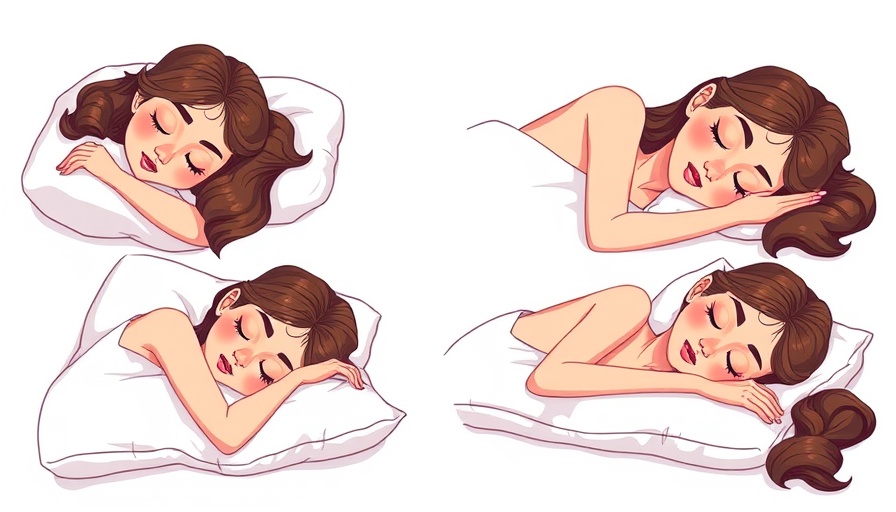
Unlocking the Secrets of Sleep: Does Your Position Reveal Your Intelligence?
As the world continues to unravel the complexities of sleep, recent findings suggest that your sleep position not only affects your rest but can potentially provide insights into your personality, education level, and health. A study by the Better Sleep Council (BSC) unveils intriguing correlations between sleep posture and demographic factors, hinting that what you do while unconscious may speak volumes about who you are.
The Fascinating Link Between Education and Sleep Position
The BSC study reveals that individuals with higher education levels, especially those with graduate degrees, tend to avoid the fetal position, which is the favored position for nearly half of all Americans (47%). This shift in sleep position preference may point to deeper psychological correlations that intertwine our educational journeys with our subconscious behaviors during sleep.
Moreover, generational differences become evident when we analyze the preferences of Baby Boomers versus Millennials and Gen Xers. The younger demographic is prevalent among freefall sleepers—those who splay their arms and legs outward during the night—while Baby Boomers favor the security of side positions. This variety prompts questions about how societal changes and mental health awareness have reshaped our sleep habits.
A Closer Look at Millennial Sleep Styles
Interestingly, the prevalence of specific sleep positions correlates with health perceptions and personality traits. For instance, individuals who sleep in the log position (arms down by their side) often describe themselves as healthier. Conversely, introverted individuals tend to shy away from the freefall posture, suggesting a possible link between our waking identities and our sleep habits. As it turns out, the ways we choose to rest reflect our psychological profiles.
Exploring Sleep Quality and Health Outcomes
Sleep is not just a matter of comfort; it directly influences our quality of life. The BSC study emphasizes that those who prefer the log position report a more restorative night’s sleep compared to those who sleep curled in a fetal position. This notion suggests that habitual positions might optimize sleep quality or highlight issues that need addressing. Especially for those who struggle with sleepwalking, adopting certain positions like the starfish may reduce episodes due to an unstable sleep environment.
Revamping Your Sleep Lifestyle with Expert Insights
According to sleep expert Terry Cralle, RN, it's essential to tailor your sleep position to your body's needs. For back sleepers, she recommends supporting the spine's natural curve to avoid discomfort, while stomach sleepers may benefit from a softer pillow or none at all to mitigate neck strain. Side sleepers, often the largest group, are encouraged to adopt positions that foster uninterrupted rest, highlighting the significant role of mattress comfort in overall sleep health.
The Social Implications of Sleep Habits
The insights drawn from these findings have far-reaching implications. For health-oriented adults, understanding how sleep positions relate to health and personality allows a deeper exploration into lifestyle choices. Not only do sleep positions affect rest quality, but they also interact with our mental and emotional well-being. Examine your own habits—do they correlate with your self-perception or public persona?
Actionable Insights for Better Sleep and Health
As we navigate the complexities of health and well-being, integrating insights from sleep studies into your lifestyle is paramount. Whether you identify as a log, freefall, or fetal sleeper, recognizing the potential positive impacts of your sleep position can guide your approach to health. Enhancing your sleep environment, experimenting with positions, and appreciating the nuances of your rest may just lead you to a more balanced, fulfilling life.
This knowledge empowers not just our sleep hygiene but may also lead to enhanced clarity in daily life activities, promoting a holistic approach to health that prioritizes rest as a component of general well-being.
Why This Matters
Sleep positions are more than mere habits; they provide a wealth of information about our health, intelligence, and lifestyle preferences. As you consider your own sleep habits, it may be time to reflect on how these unconscious choices reflect your conscious self. Unlocking the secrets of sleep positions may reveal not just who you are but who you can become.
For anyone looking to optimize their rest and enhance overall health, it’s crucial to evaluate not just the number of hours spent asleep, but the quality and style of sleep as well. Embrace these insights to pave the way towards greater wellness.
 Add Row
Add Row  Add Element
Add Element 



 Add Row
Add Row  Add
Add 


Write A Comment